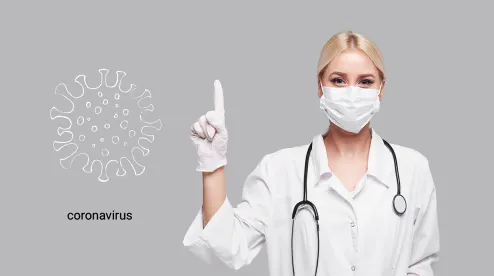To address the COVID-19 public health crisis, FDA issued two immediately in effect guidance documents: FDA Guidance for Industry (April 2020) Enforcement Policy for Face Masks and Respirators During the Coronavirus Disease (COVID-19) Public Health Emergency (Revised)i, and FDA Guidance for Industry (March 2020) Enforcement Policy for Gowns, Other Apparel, and Gloves During the Coronavirus Disease (COVID-19) Public Health Emergencyii.
These new guidance documents were issued to provide policies to help expand the availability of surgical apparel for health care professionals, including gowns, gloves, face masks, face shields and respirators for the duration of the ongoing COVID-19 public health emergency. These new policies are temporary, and intended to remain in effect only for the duration of the public health emergency related to COVID-19 declared by the Department of Health and Human Services (HHS), including any renewals made by the HHS Secretary in accordance with section 319(a)(2) of the Public Health Services (PHS) Act.
Gowns and other apparel, face masks, face shields, and respirators are considered medical devices if they meet the definition for a medical device set forth in section 201(h) of the Food and Drug Cosmetic Act, which provides in relevant part that a medical device is “an instrument, apparatus . . . or other similar or related article, including a component part, or accessory which is: . . . intended for use in the diagnosis of disease or other conditions, or in the cure, mitigation, treatment, or prevention of disease . . . .” In other words, any gowns, other apparel, face mask, face shield, or respirator used in the prevention of COVID-19 transmission would qualify as a medical device.
Gowns and Other Apparel, Face Masks and Face Shields
In order to increase the availability of equipment that might offer some benefit to health care providers and the general public during the COVID-19 outbreak, FDA does not intend to object to the distribution and use of improvised PPE that are intended for a medical purpose (whether medical personnel or the general public) without compliance with existing FDA regulatory requirements, when no alternatives, such as FDA-cleared gowns, other surgical apparel, and/or gloves, face masks (with or without a face shield (not including respirators)) and face shields, are available. FDA currently believes that gowns, other apparel, face masks, face shields and respirators do not create an undue risk in light of the public health emergency where:
-
The product includes labeling that accurately describes the product (as opposed to a surgical gown or surgical mask or filtering facepiece respirator (FFR)) and includes a list of the body contacting materials (which does not include any drugs or biologics);
-
The face shield does not contain any materials that will cause flammability, or the product meets Class I or Class II flammability requirement per 16 CFR 1610 (unless labeled with a recommendation against use in the presence of high intensity heat source or flammable gas);
-
The product includes labeling that makes recommendations that would reduce sufficiently the risk of use, for example, recommendations against: use in any surgical setting or where significant exposure to liquid, bodily or other hazardous fluids, may be expected; use in a clinical setting where the infection risk level through inhalation exposure is high; and use in the presence of a high intensity heat source or flammable gas; and
-
The product is not intended for any use that would create an undue risk in light of the public health emergency, for example the labeling does not include uses for antimicrobial or antiviral protection or related uses or uses for infection prevention or reduction or related uses and does not include particulate filtration claims.
Surgical Masks
Surgical masks that cover the user’s nose and mouth and provide a physical barrier to fluids and particulate materials and are tested for flammability and biocompatibility are considered class II devices. During this crisis, FDA does not intend to object to the distribution and use of surgical masks without compliance with the following regulatory requirements where the surgical mask does not create an undue risk where:
-
The product meets fluid resistance testing (liquid barrier performance) consistent with standard ASTM F186211 Standard Test Method for Resistance of Medical Face Masks to Penetration by Synthetic Blood (Horizontal Projection of Fixed Volume at a Known Velocity);
-
The product meets Class I or Class II flammability requirement per 16 CFR 1610 (unless labeled with a recommendation against use in the presence of high intensity heat source or flammable gas);
-
The product includes labeling that accurately describes the product as a surgical mask and includes a list of the body contacting materials (which does not include any drugs or biologics); and
-
The product is not intended for any use that would create an undue risk in light of the public health emergency, for example the labeling does not include uses for antimicrobial or antiviral protection or related uses or uses for infection prevention or reduction or related uses and does not include particulate filtration claims.
N95 Respirators
During this crisis, when FDA-cleared or NIOSH-approved N95 respirators aren’t available, FDA does not intend to object to the distribution (including importation) and use of respirators identified in the CDC recommendations. However, the FDA recommends that importers take the necessary steps to verify the authenticity of the products they import.
Emergency Use Authorizations (EUAs)
During this health crisis, to aid in the safe reuse and conservation of PPE for a medical purpose, FDA is interested in interacting with manufacturers on the decontamination of disposable face masks and filtering facepiece respirators to facilitate marketing authorization through an emergency use authorization (EUA). The FDA is also interested in working with manufacturers of masks and respirators to increase the supply of these devices.



 />i
/>i
